Proof, Biden knew of the collapse of the entire country of Afghanistan and frankly so did Ashraf Ghani. Biden told Ghani too during his visit to the White House there will be no more air support after August 31, 2021.
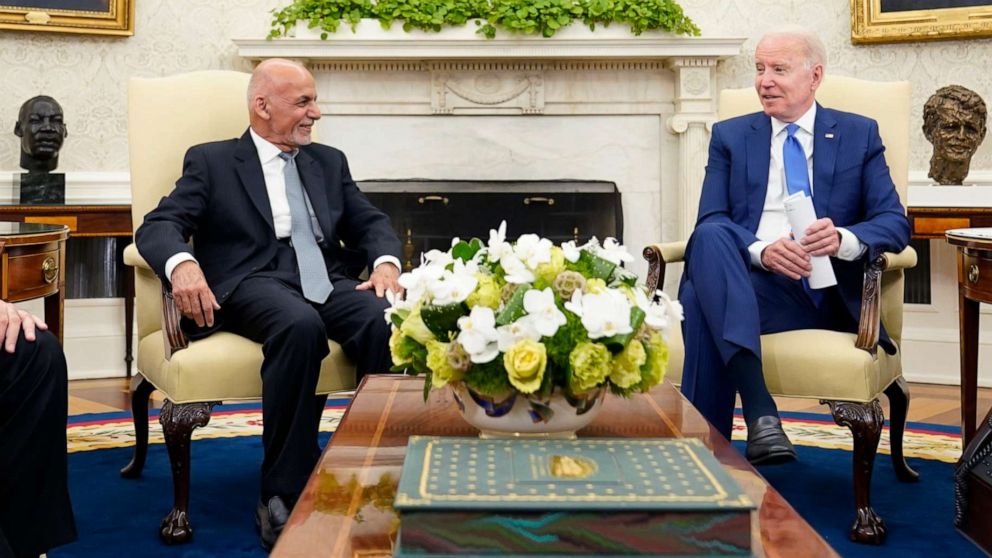 source
source
But read on….
(I was asking myself earlier how come there have not been any leaks coming out of the White House. They usually come due to a scandal, there is no bigger scandal than the Biden exit strategy from Afghanistan, so here is the first major leak)
CHANGE PERCEPTION
July 23, 2021
Reported by Reuters –
Here are excerpts from that call, based on a transcript and recording reviewed by Reuters:
BIDEN: Mr. President. Joe Biden.
GHANI: Of course, Mr. President, such a pleasure to hear your voice.
BIDEN: You know, I am a moment late. But I mean it sincerely. Hey look, I want to make it clear that I am not a military man any more than you are, but I have been meeting with our Pentagon folks, and our national security people, as you have with ours and yours, and as you know and I need not tell you the perception around the world and in parts of Afghanistan, I believe, is that things aren’t going well in terms of the fight against the Taliban.
And there’s a need, whether it is true or not, there is a need to project a different picture.
…..
BIDEN: If you empower Bismillah [Defense Minister Bismillah Khan Mohammadi] to execute a strategy focused on key parts of the population centers, and I’m not a military guy, so I’m not telling you what that plan should precisely look like, you’re going to get not only more help, but you’re going to get a perception that is going to change in terms of how , um…[unclear].. our allies and folks here in the States and other places think you’re doing.
You clearly have the best military, you have 300,000 well-armed forces versus 70-80,000 and they’re clearly capable of fighting well, we will continue to provide close air support, if we know what the plan is and what we are doing. And all the way through the end of August, and who knows what after that.
We are also going to continue to make sure your air force is capable of continuing to fly and provide air support. In addition to that we are going to continue to fight hard, diplomatically, politically, economically, to make sure your government not only survives, but is sustained and grows because it is clearly in the interest of the people of Afghanistan, that you succeed and you lead. And though I know this is presumptuous of me on one hand to say such things so directly to you, I have known you for a long while, I find you a brilliant and honorable man.
But I really think, I don’t know whether you’re aware, just how much the perception around the world is that this is looking like a losing proposition, which it is not, not that it necessarily is that, but so the conclusion I’m asking you to consider is to bring together everyone from [Former Vice President Abdul Rashid] Dostum, to [Former President Hamid] Karzai and in between, if they stand there and say they back the strategy you put together, and put a warrior in charge, you know a military man, [Defense Minister Bismillah] Khan in charge of executing that strategy, and that will change perception, and that will change an awful lot I think.
…
GHANI: Mr. President, we are facing a full-scale invasion, composed of Taliban, full Pakistani planning and logistical support, and at least 10-15,000 international terrorists, predominantly Pakistanis thrown into this, so that dimension needs to be taken account of.
Second, what is crucial is, close air support, and if I could make a request, you have been very generous, if your assistance, particularly to our air force be front loaded, because what we need at this moment, there was a very heavily reliance on air power, and we have prioritized that if it could be at all front-loaded, we will greatly appreciate it.
And third, regarding procedure for the rest of the assistance, for instance, military pay is not increased for over a decade. We need to make some gestures to rally everybody together so if you could assign the national security advisor or the Pentagon, anyone you wish to work with us on the details, so our expectations particularly regarding your close air support. There are agreements with the Taliban that we [or “you” this is unclear] are not previously aware of, and because of your air force was extremely cautious in attacking them.
And the last point, I just spoke again to Dr. Abdullah earlier, he went to negotiate with the Taliban, the Taliban showed no inclination. We can get to peace only if we rebalance the military situation. And I can assure you…
BIDEN: [crosstalk]
GHANI: And I can assure you I have been to four of our key cities, I’m constantly traveling with the vice president and others, we will be able to rally. Your assurance of support goes a very long way to enable us, to really mobilize in earnest. The urban resistance, Mr. President is been extraordinary, there are cities that have taken a siege of 55 days and that have not surrendered. Again, I thank you and I’m always just a phone call away. This is what a friend tells a friend, so please don’t feel that you’re imposing on me.
BIDEN: No, well, look, I, thank you. Look, close air support works only if there is a military strategy on the ground to support.
Reporting by Aram Roston and Nandita Bose
***
In a separate item published by
Reuters –
(Reuters) – In the last call between U.S. President Joe Biden and his Afghanistan counterpart before the Taliban seized control of the country, the leaders discussed military aid, political strategy and messaging tactics, but neither Biden nor Ashraf Ghani appeared aware of or prepared for the immediate danger of the entire country falling to insurgents, a transcript reviewed by Reuters shows.
The men spoke for roughly 14 minutes on July 23. On August 15, Ghani fled the presidential palace, and the Taliban entered Kabul. Since then, tens of thousands of desperate Afghans have fled and 13 U.S. troops and scores of Afghan civilians were killed in a suicide bombing at the Kabul airport during the frenetic U.S. military evacuation.
Reuters reviewed a transcript of the presidential phone call and has listened to the audio to authenticate the conversation. The materials were provided on condition of anonymity by a source who was not authorized to distribute it.
In the call, Biden offered aid if Ghani could publicly project he had a plan to control the spiraling situation in Afghanistan. “We will continue to provide close air support, if we know what the plan is,” Biden said. Days before the call, the U.S. carried out air strikes to support Afghan security forces, a move the Taliban said was in violation of the Doha peace agreement.
The U.S. president also advised Ghani to get buy-in from powerful Afghans for a military strategy going forward, and then to put a “warrior” in charge of the effort, a reference to Defense Minister General Bismillah Khan Mohammadi.
Biden lauded the Afghan armed forces, which were trained and funded by the U.S. government. “You clearly have the best military,” he told Ghani. “You have 300,000 well-armed forces versus 70-80,000 and they’re clearly capable of fighting well.” Days later, the Afghan military started folding across provincial capitals in the country with little fight against the Taliban.
In much of the call, Biden focused on what he called the Afghan government’s “perception” problem. “I need not tell you the perception around the world and in parts of Afghanistan, I believe, is that things are not going well in terms of the fight against the Taliban,” Biden said. “And there is a need, whether it is true or not, there is a need to project a different picture.”
Biden told Ghani that if Afghanistan’s prominent political figures were to give a press conference together, backing a new military strategy, “that will change perception, and that will change an awful lot I think.”
The American leader’s words indicated he didn’t anticipate the massive insurrection and collapse to come 23 days later. “We are going to continue to fight hard, diplomatically, politically, economically, to make sure your government not only survives, but is sustained and grows,” said Biden.
The White House Tuesday declined to comment on the call.
After the call, the White House released a statement that focused on Biden’s commitment to supporting Afghan security forces and the administration seeking funds for Afghanistan from Congress.
Ghani told Biden he believed there could be peace if he could “rebalance the military solution.” But he added, “We need to move with speed.”
“We are facing a full-scale invasion, composed of Taliban, full Pakistani planning and logistical support, and at least 10-15,000 international terrorists, predominantly Pakistanis thrown into this,” Ghani said. Afghan government officials, and U.S. experts, have consistently pointed to Pakistani support for the Taliban as key to the group’s resurgence.
The Pakistani Embassy in Washington denies those allegations. “Clearly the myth of Taliban fighters crossing from Pakistan is unfortunately an excuse and an afterthought peddled by Mr. Ashraf Ghani to justify his failure to lead and govern,” an embassy spokesman told Reuters.
Reuters tried to reach Ghani’s staff for this story, in calls and texts, with no success. The last public statement from Ghani, who is believed to be in the United Arab Emirates, came on August 18. He said he fled Afghanistan to prevent bloodshed.
By the time of the call, the United States was well into its planned withdrawal from Afghanistan, which Biden had postponed from the May date set by his predecessor, Donald Trump. The U.S. military had closed its main Afghanistan air base, at Bagram, in early July.
As the two presidents spoke, Taliban insurgents controlled about half of Afghanistan’s district centers, indicating a rapidly deteriorating security situation.
Afghanistan was promising a shift in its military strategy, to start focusing on protecting “population centers” – major cities – rather than fighting to protect rural territories. Biden referred approvingly of that strategy. He said that doing so would help not just on the ground but in the “perception” internationally that was required to shore up world support for the Afghan government.
“I’m not a military guy, so I’m not telling you what a plan should precisely look like, you’re going to get not only more help, but you’re going to get a perception that is going to change …,” Biden said.
Ghani, for his part, assured Biden that “your assurance of support goes a very long way to enable us, to really mobilize us in earnest.”
In a little over two weeks after Biden’s call with Ghani, the Taliban captured several provincial Afghan capitals and the United States said it was up to the Afghan security forces to defend the country. “These are their military forces, these are their provincial capitals, their people to defend,” Pentagon spokesman John Kirby said on August 9.
On August 11, U.S. intelligence reports indicated Taliban fighters could isolate Afghanistan’s capital in 30 days and possibly take it over within 90. Instead, the fall happened in less than a week.
The Biden-Ghani call also underscored persistent political infighting that plagued the Afghan government.
When Biden asked him to include former Afghan President Hamid Karzai in a press conference, Ghani pushed back. “Karzai would not be helpful,” he said. “He is contrary, and time is of the essence, we cannot bring every single individual … We have tried for months with President Karzai. Last time we met for 110 minutes; he was cursing me and he was accusing me of being a U.S. lackey.”
Biden paused before responding: “I’m going to reserve judgment on that.”
Karzai could not be reached for comment, despite calls and texts to one of his aides.
SECOND CALL WITH TOP STAFF
In a follow-up call later that day that did not include the U.S. president, Biden’s National Security Advisor Jake Sullivan, General Mark Milley and U.S. Central Command commander General Frank McKenzie spoke to Ghani. Reuters also obtained a transcript of that call.
In this call, too, an area of focus was the global perception of events on the ground in Afghanistan. Milley, chairman of the Joint Chiefs of Staff, told Ghani “the perception in the United States, in Europe and the media sort of thing is a narrative of Taliban momentum, and a narrative of Taliban victory. And we need to collectively demonstrate and try to turn that perception, that narrative around.”
“I do not believe time is our friend here. We need to move quickly,” McKenzie added.
A spokesperson for McKenzie declined to comment. A spokesman for Milley did not respond by publication time.
Reporting by Aram Roston and Nandita Bose in Washington. Editing by Ronnie Greene and Heather Timmons
Related reading:
White House readout of the meeting between Ashraf Ghani and President Biden:
here and here
 Taliban arrives in Pakistan to discuss more cooperation and the way forwarad.
Taliban arrives in Pakistan to discuss more cooperation and the way forwarad.
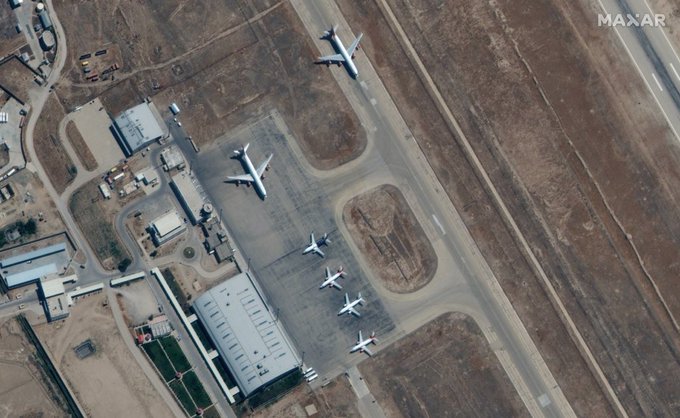
![Passengers disembark as they arrive from Kandahar, at Hamid Karzai International Airport in Kabul. [Wali Sabawoon/AP Photo]](https://www.aljazeera.com/wp-content/uploads/2021/09/AP21248376529092.jpg?resize=1170%2C780)
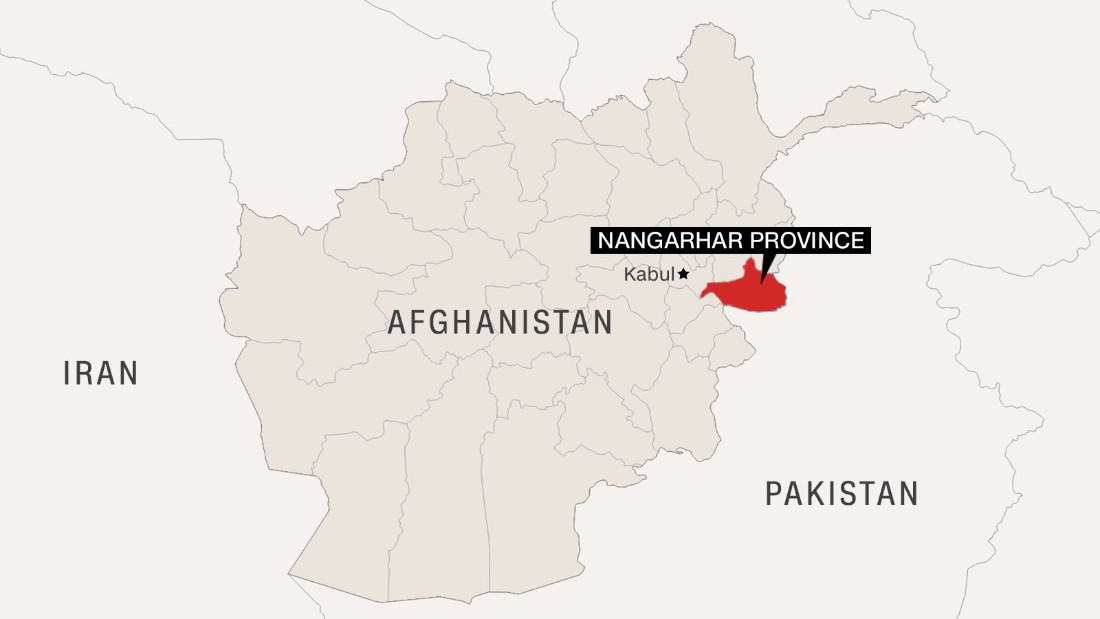


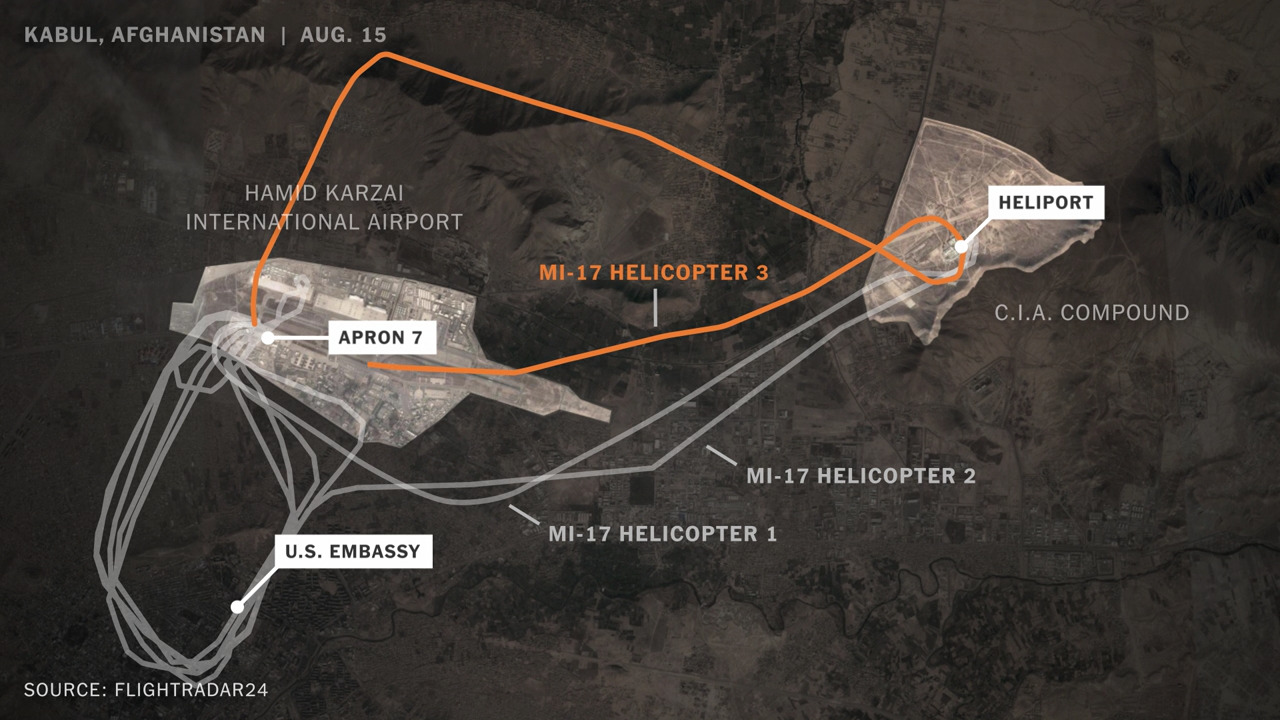
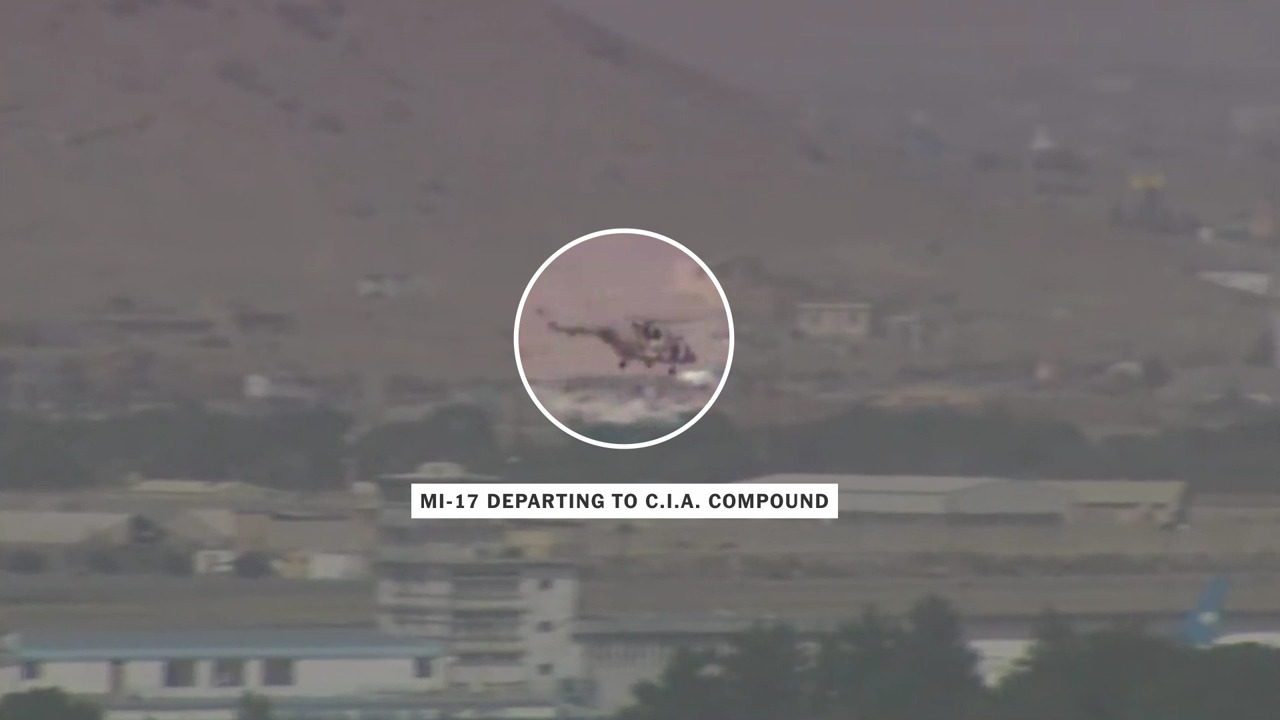
 Voice of America is taxpayer funded. And Radio Free Europe is United States government-funded organization that broadcasts and reports news, information, and analysis to countries in Eastern Europe, Central Asia, Caucasus, and the Middle East.
Voice of America is taxpayer funded. And Radio Free Europe is United States government-funded organization that broadcasts and reports news, information, and analysis to countries in Eastern Europe, Central Asia, Caucasus, and the Middle East.